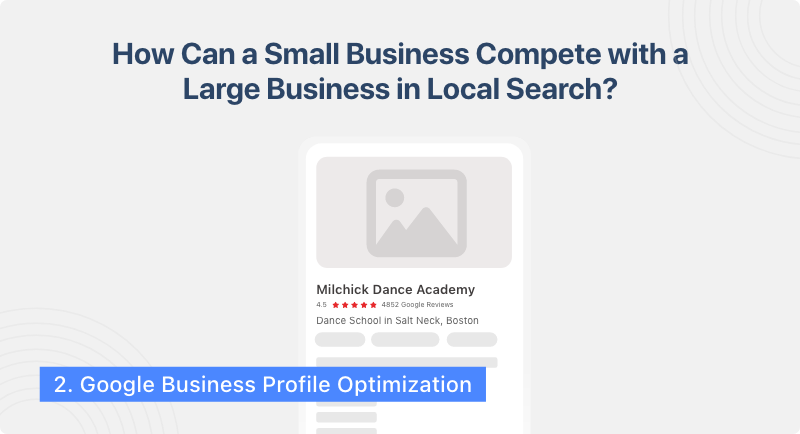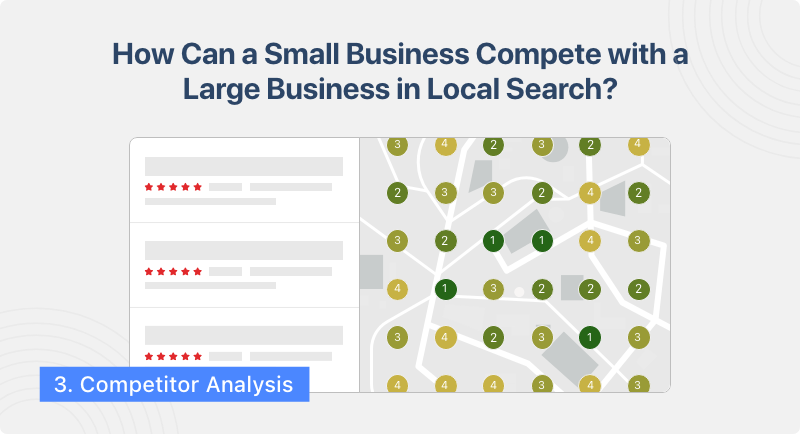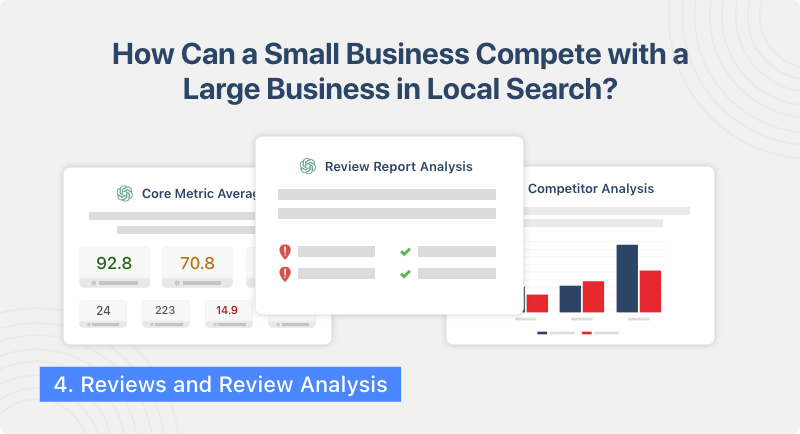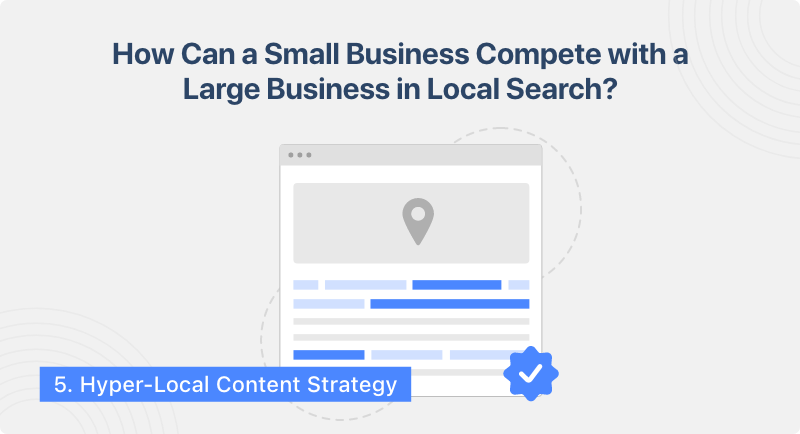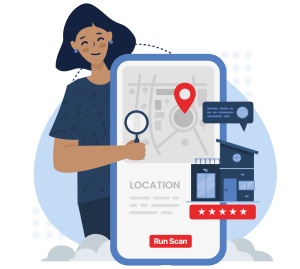Local businesses often face uphill battles when competing with larger companies online. Limited budgets, smaller teams, and less brand recognition can make it seem impossible to win in the digital space.
So how can small businesses compete successfully with larger businesses that dominate search results and have extensive resources? The answer lies in leveraging local SEO to connect with nearby customers.
By focusing on hyper-local strategies, small and medium-sized businesses (SMBs) with more modest resources can gain visibility in local search results and compete head-to-head with much larger competitors. The key is knowing where to focus your efforts.
Using tools like geo-grid rank tracking and strategies like review analysis, SMBs can achieve significant results. With consistent local SEO efforts, even businesses with minimal resources can potentially appear alongside industry giants in search results!
How Can a Small Business Compete with a Large Business in Local Search?
1. Geo-Grid Rank Tracking: Pinpointing Local Opportunities
When it comes to local SEO, understanding exactly where your business ranks in specific areas is essential; and that's where geo-grid rank tracking comes in.
A geo-grid rank tracker like Local Falcon provides a highly visual representation of your rankings across a specific geographic area. Instead of guessing how well your business performs in local searches by looking at overall traffic, you get precise data on how your visibility fluctuates from one block to the next.
This granular, hyper-local level of insight allows small businesses to identify areas where they rank well and focus efforts on improving visibility where they don't.
For example, instead of trying to rank highly in an entire city, competing directly with bigger businesses who may dominate on a broader scale, you can target smaller neighborhoods where competition may be less intense.
By tackling local search optimization one map pin at a time, you can steadily improve your presence and build momentum, eventually vying with major competitors for a coveted spot in Google's local pack.
Key Actionable Tips: Use geo-grid rank tracking to analyze local search visibility regularly, ideally running bi-weekly scans to track progress. When optimizing, focus on keywords and areas that you're ranking pretty well among competition for, but maybe not appearing frequently in Google's 3-pack yet. This will provide a better ROI than trying to work your way up from the bottom where your rankings are the worst.
2. Google Business Profile Optimization: Polishing Your Most Important Local SEO Asset
Your Google Business Profile (GBP) is one of the most powerful tools for competing locally. This free resource from Google allows businesses to manage how they appear in local search results and on Google Maps. Small businesses can outshine larger competitors simply by fully optimizing their GBP.
To optimize your profile:
- Ensure your business information is (and stays) complete and accurate, including your address, phone number, website, and hours.
- Add high-quality photos of your location, staff, products, and services.
- Regularly post updates about promotions, events, or news.
- Collect and respond promptly to customer reviews, whether bad or good.
A well-maintained and optimized GBP not only boosts your visibility, but also builds trust with potential customers, helping them choose your business over competitors.
Key Actionable Tips: Use Local Falcon's Falcon AI feature to identify areas where your GBP could be improved. Falcon AI provides instantly actionable optimization recommendations, such as fixing missing or inconsistent information and suggesting better category choices to align with your services. This ensures your GBP is fully optimized to attract more local customers and improve search rankings.
3. Competitor Analysis: Learning from the Big Players
How can a small business compete with a large business in terms of local SEO? By studying the competition! Analyze what larger businesses in your area are doing successfully, then find ways to replicate and improve on those strategies.
Here are some key elements of competitors' local SEO strategies to examine:
- Keywords: Identify the keywords big competitors rank for and create localized content around those terms or add relevant missing categories to your GBP.
- Backlinks and Citations: Look at the websites linking to your competitors, including other directories and review sites they're on, and explore opportunities to build similar backlinks and citations.
- Content Strategy: Observe the types of content larger businesses produce, such as blogs or videos, and consider creating similar content tailored to your local audience.
- Reviews: Analyze competitor reviews to understand what customers like or don't like about their business, then apply learnings to your own business to improve reviews and compete more effectively (more on this below).
Key Actionable Tips: Use Local Falcon's competitor analysis features to pinpoint where your competitors are outperforming you in local search, including for specific keywords at specific map pins, but may be vulnerable. Then, focus on closing the gaps where your competitors are most vulnerable (i.e., where you are not drastically behind them in the rankings) to start capturing a larger share of the local search market one step at a time.
4. Reviews and Review Analysis: Managing Reputation and Boosting Rankings
Google reviews are one of the most important direct ranking factors in local SEO. Customers trust businesses with high ratings and positive reviews, and Google rewards businesses with strong reviews by ranking them higher in local search results. For SMBs, reviews can be a powerful secret weapon for competing with larger competitors.
Here's how to leverage reviews effectively:
- Collect Reviews: Encourage satisfied customers to leave reviews on your Google Business Profile (make it easy for them by providing a Google review link).
- Respond to Reviews: Address both positive and negative reviews promptly and professionally. This shows that you value customer feedback and are committed to improvement, as well as improves engagement ranking signals for your GBP.
- Analyze Trends: Use Local Falcon's AI Reviews Analysis feature to identify common sentiment themes in your reviews. Address issues immediately and lean into strengths to maximize positive reviews and rankings.
Key Actionable Tips: Keep an eye on competitors' reviews to spot patterns that you may be able to capitalize on to compete more effectively. For example, if customers frequently complain about a competitor's slow service, emphasize your speed and efficiency in your messaging. Or, if customers love a certain product that a competitor offers, consider adding a similar product to your own offerings.
5. Hyper-Local Content Strategy: Building a Stronger Local Presence
Content tailored to your local audience in specific target areas can significantly boost your online presence, as well as build connections within the community. While larger businesses might produce generic content, smaller businesses can stand out by creating hyper-local, community-focused material.
Ideas for local content include:
- Blog posts about local events or issues.
- Landing pages targeting specific neighborhoods or regions.
- Customer success stories or testimonials from local patrons.
- Videos showcasing your involvement in the community.
By focusing on the interests and needs of a hyper-local audience, you can create a personalized, local connection that larger competitors often overlook.
Key Actionable Tips: Partner with local influencers, community groups, or businesses to create co-branded content. This not only strengthens your connection to the local audience, but also expands your reach by leveraging the established trust and networks of your collaborators and building backlinks.
Also, focus on niche opportunities that big businesses might pass over. For example, create content or campaigns tailored to hyper-local events or community topics that are close to the heart of your audience, which larger businesses may not bother themselves with.
Conclusion
Small and medium-sized businesses may not have the same resources as large companies, but they do have one advantage: the ability to connect with their local audience in a way that feels personal and authentic.
So, what's our final answer to the question of how can small businesses compete with big competitors? By thinking local, acting strategic, and using the right local SEO tools! With the right approach, even the smallest businesses can stand out in search results and win over customers, one local search at a time.

